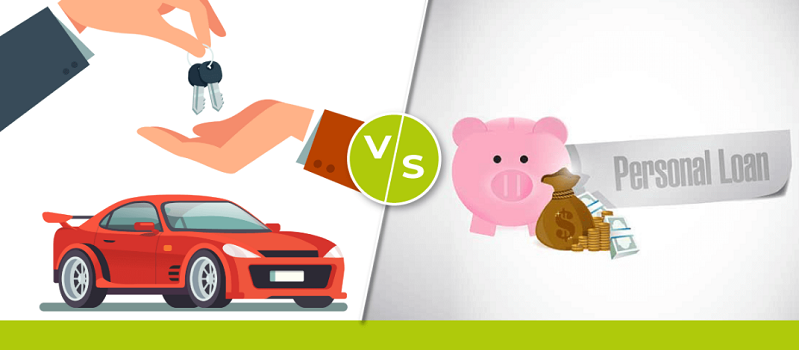Key takeaways
- A personal loan can be used for various purposes such as home refurbishment, weddings, vacations and the like, but car loans can be strictly used for only the purchase of a car.
- Personal loans carry higher interest rates than car loans as the risk of default is high, and lender do not have the security to liquidate to cover their cash.
- Both personal loans and car loans are paid down over a period of time. Fixed monthly instalments make the debt manageable and build your credit rating.
Car loans are often considered personal loans, but they are not, in fact. A personal loan is an unsecured loan, while a car loan is a secured loan backed by your car. Both terms are interchangeably used because you do not need additional collateral to put down against the loan, such as your house. You are absolutely free to use your car the way you want, and there will be no restrictions on the mileage.
What are personal loans?
A personal loan can be obtained from a direct lender and bank and can be used for a variety of purposes – vacation, wedding, medical emergency, to name a few. However, these loans are not aimed at funding your business expenses.
You can use these loans for the down payment of your car as well without putting down anything. For instance, if you need money to arrange a down payment, you can take out a personal loan. There is no risk of losing anything if you fail to pay off personal loans in Ireland.
Interest rates and terms of personal loans
Since personal loans are not subject to collateral, there is a high risk of default involved in ending your money. As a matter of fact, your lender will charge high-interest rates. If you are using these loans with a bad credit rating, interest rates will be even higher.
Most of the lenders will be indisposed to sign off on your application if your credit score is poor. Your credit score will determine the principal and the interest rate. If you manage to get approval in the face of a poor credit report, the borrowing sum will be small, and the interest rate will be high. Lenders do so to offset their risk. When your credit score is good, you are more likely to get the nod for a bigger sum.
The repayment length of personal loans, in most cases, is not more than 18 months. However, if the principal amount is big, it can span over a period of 24 to 36 months. A longer repayment period will whittle down the size of monthly instalments. However, you will end up paying a lot more sum as total interest. If you are sure about your repaying capacity, you should opt for a shorter period.
What are the upsides and downsides of personal loans?
Here are the pros and cons of personal loans:
- You can use these loans for any of the reasons. There will be no restrictions on the usage of these loans.
- You can choose between shorter and longer repayment term. Flexible payments make it more manageable to handle the debt.
- Interest rates will be quite higher as compared to car loans as the risk is quite high due to no security against the loan.
- Getting approval is not so easy. In case of a bad credit rating, you will likely find it difficult to qualify for a loan.
What are car loans?
Car loans that you apply from a lender or your bank are secured loans as they are backed by your car. It means your lender will repossess your car on default. As is the case with a mortgage, your lender, though you are permitted to drive it, retains the ownership of your car, unless you make the final payment. The title of your car is transferred to you when you clear the whole of the debt and that is the reason why you cannot sell it even if you wish to.
Interest rates and the repayment term of car loans
Interest rates of car loans in Ireland will be much lower than personal loans as they are secured by your car. This lowers the risk of your lender in case you make a default. However, if your credit rating is bad, you will find it slightly harder to avail of lower interest rates. The good is that your bad credit rating will not keep you from getting the nod for a car loan.
Once the loan is sanctioned, you will start making payments in fixed instalments. The repayment length of your can be up to five years. The interest rates and the repayment term depend on your income. If you choose a longer repayment period, you will end up paying a lot more money in interest. However, if your income does not support shorter payment periods, it seems to be a better alternative. At least there will not be a risk of falling behind payments.
What are the advantages and drawbacks of car loans?
Here are the pros and cons of car loans:
- You can qualify for a lower interest rate compared to a personal loan.
- Even if your credit history is bad, you can qualify for these loans.
- Car loans are not just available to lenders. You can also get them from dealers. However, they are known as hire purchases.
- Fixed payments will make the debt manageable.
- You cannot get the title of your car unless you settle your debt.
- You will need to make a deposit, which is normally 10% of the value of your car.
- Car loans cannot be used for any purposes other than a car purchase.
The final comment
Car loans and personal loans are both different from each other. The former is a secured loan backed by your car, and the latter does not involve any security and, therefore, is unsecured in nature.

Caleb works as a senior content writer at Financealoan for the past 3 years. He is a writing enthusiast and invests a good time in exploring and writing about financial trends. His keenness in exploring a topic to create a research-based piece is simply unmatched. He believes in including a texture of authenticity with real-time examples and facts.
Caleb’s blogs and articles reveal deep-seated knowledge and expertise. His educational qualification forms the base of his excellent command over the industry and Jargon. He is a postgraduate in Finance and is currently involved in exploring the world of the stock market.






